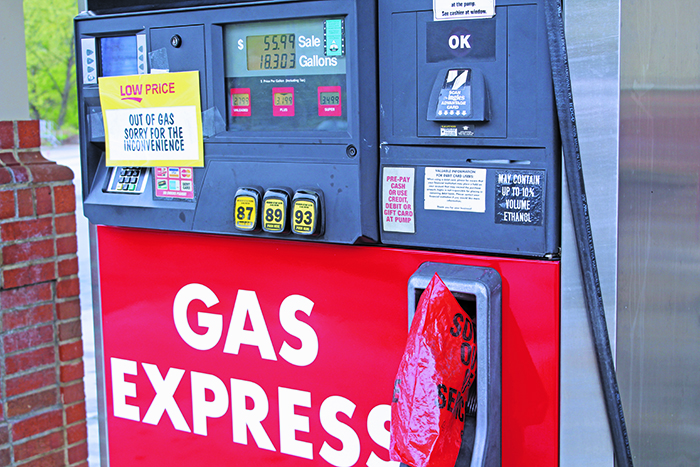The gas pumps at the Ingles Gas Express in Spruce Pine sat covered with red “out of service” bags and signs apologizing for the lack of gas most of this past week. Such sights were common in Mitchell County and throughout the state as consumers flocked to fuel following a pipeline hack. (MNJ photo/Cory Spiers)
SPRUCE PINE — Long lines at gas stations in Mitchell County were a common sight this past week as panic-buying put a blitz on fuel shortages in the wake of a cyberattack that put the Colonial Pipeline offline earlier this month.
The Colonial Pipeline, which moves about 45 percent of the East Coast’s fuel, shut down on Friday, May 8. As news of the shutdown and its potential implications trickled out to the news media and consumers, long lines at the pump quickly became a harsh reality on Monday, May 10.
Lines at both Valero stations in Spruce Pine backed up into the main roads. Several area stations, including Spruce Pine Ingles and County Line Market, ran completely dry within hours of the onset of panic-buying.
The pumps at Spruce Pine Ingles, County Line Market and other area stations sat covered in plastic bags after being completely bought out.
Patrick De Haan, an oil analyst with GasBuddy, said that as of Wednesday, May 12, 65 percent of all stations in North Carolina reported being completely dry.
North Carolina Governor Roy Cooper this past week declared a state of emergency in light of the fuel situation, joining Georgia, Virginia and Florida as states to issue such a proclamation.
Cooper said on Wednesday, May 12 that the Environmental Protection Agency’s actions to waive certain fuel requirements to increase North Carolina’s fuel supplies in response to the cyberattack were helping.
Cooper went on to urge people not to hoard gas.
“Please don’t buy gas unless you’re low and report any cases of price gouging,” he said. “We will continue our efforts to help make sure there is an adequate supply of fuel.”
Cooper’s message echoes the local message delivered by Mitchell County Emergency Management which said the county experienced gasoline shortages not due to a lack of gasoline but rather due to the unnecessary purchase of gas by many.
“Just as with the great toilet paper shortage of 2020, the rate of consumption has not gone up, only the rate of purchase,” the organization said in a Facebook post on Tuesday, May 11. “Please reduce the number of unnecessary trips and fuel as you normally would have.”
Mitchell County Emergency Management also confirmed that at the time of that post, emergency service vehicles had not been impacted.
Before the cyberattack, the state’s fuel distribution infrastructure was already hurting as it dealt with a shortage of authorized hazardous materials drivers.
The Colonial Pipeline resumed operations late Wednesday, May 12 but a statement from the company cautioned that it could be “several days” until fuel deliveries return to normal. A tanker truck was seen unloading its fuel contents at the Valero on 19E early on Thursday, May 13.
The panic-buying and subsequent limited supply of gas are coupled with rising prices. As of Wednesday, May 12, the average price of a gallon of gas in the United States eclipsed $3 for the first time in six years.

